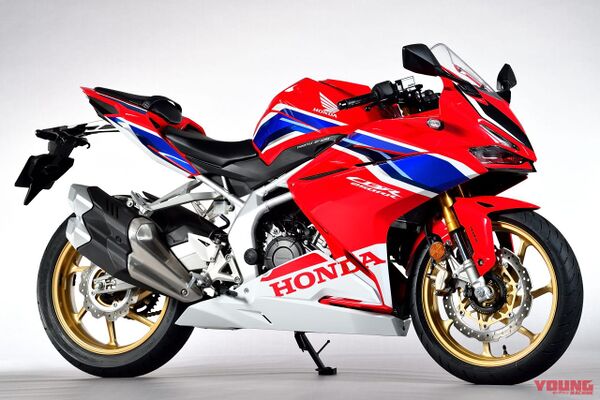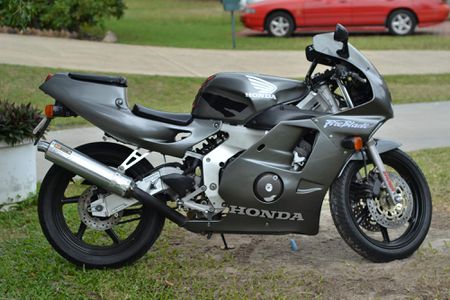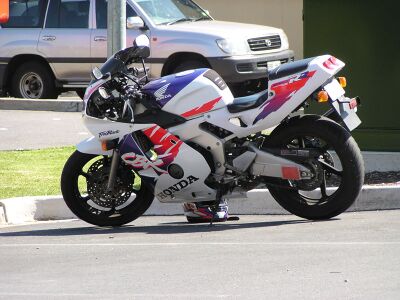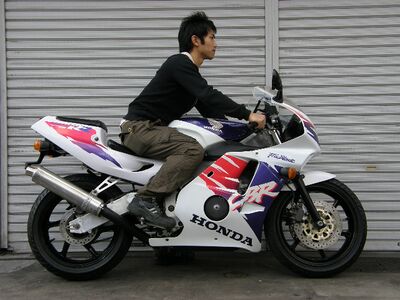Difference between revisions of "Honda CBR250RR"
m |
m |
||
| (2 intermediate revisions by the same user not shown) | |||
| Line 1: | Line 1: | ||
{{DISPLAYTITLE:Honda CBR250RR}} | {{DISPLAYTITLE:Honda CBR250RR}} | ||
| + | {{#seo: | ||
| + | |keywords={{PAGENAME}}, review, specs, owners manual, service manual, guide | ||
| + | |og:image= | ||
| + | }} | ||
__notoc__ | __notoc__ | ||
| − | [[File: Cbr250rr_mod1.jpg | center | | + | [[File: Cbr250rr_mod1.jpg | center | 600px]] |
The '''Honda CBR250RR''' sports bike model entered the market in 1990 as the youngest model in the Honda sports lineup. The model was intended for the domestic Japanese market, but in some years it was available in the Australian market. | The '''Honda CBR250RR''' sports bike model entered the market in 1990 as the youngest model in the Honda sports lineup. The model was intended for the domestic Japanese market, but in some years it was available in the Australian market. | ||
{{Ads_top}} | {{Ads_top}} | ||
| + | |||
| + | ''' Lineup: ''' | ||
| + | * [[Honda_CBR250RR_NEW | Honda CBR250RR]] | ||
| + | * [[Honda_CBR400RR | Honda CBR400RR]] | ||
| + | * [[Honda_CBR600RR | Honda CBR600RR]] | ||
| + | * [[Honda_CBR900RR_Fireblade | Honda CBR900RR]] | ||
| + | * [[Honda_CBR1000RR_Fireblade | Honda CBR1000RR]] | ||
| + | |||
| + | ''' Main competitors: ''' | ||
| + | * [[Kawasaki_ZXR250 | Kawasaki ZXR 250]] | ||
| + | * [[Suzuki_GSX-R250 | Suzuki GSX-R 250]] | ||
| + | * [[Yamaha_FZR250 | Yamaha FZR 250]] | ||
| + | |||
Like other similar models from other manufacturers, the Honda CBR250RR was distinguished by high technical characteristics and good equipment at that time - a cast aluminum frame, rigid sports suspensions, powerful disc brakes, an in-line 4-cylinder engine with a timing drive in the form of gears, a 6-speed gearbox. | Like other similar models from other manufacturers, the Honda CBR250RR was distinguished by high technical characteristics and good equipment at that time - a cast aluminum frame, rigid sports suspensions, powerful disc brakes, an in-line 4-cylinder engine with a timing drive in the form of gears, a 6-speed gearbox. | ||
| Line 10: | Line 27: | ||
In 2011, Honda "resurrects" the once popular model, introducing under its name a budget 1-cylinder motorcycle for beginners - [[Honda_CBR250 | Honda CBR250R]], which was focused on Asian countries - naturally, has nothing to do with the Honda CBR250RR. | In 2011, Honda "resurrects" the once popular model, introducing under its name a budget 1-cylinder motorcycle for beginners - [[Honda_CBR250 | Honda CBR250R]], which was focused on Asian countries - naturally, has nothing to do with the Honda CBR250RR. | ||
| − | |||
| − | |||
| − | |||
| − | |||
| − | |||
== Photos == | == Photos == | ||
| − | + | <gallery mode="packed" heights=200px> | |
| − | + | File:1999 Honda Cbr250rr 14844069.jpg| | |
| − | + | File:Bike2 cbr250rr.jpg| | |
| − | + | File:PB290011.JPG| | |
| − | + | </gallery> | |
| − | |||
{{Ads_feed}} | {{Ads_feed}} | ||
{{ads_post}} | {{ads_post}} | ||
Latest revision as of 12:37, 27 June 2023
The Honda CBR250RR sports bike model entered the market in 1990 as the youngest model in the Honda sports lineup. The model was intended for the domestic Japanese market, but in some years it was available in the Australian market.
Lineup:
Main competitors:
Like other similar models from other manufacturers, the Honda CBR250RR was distinguished by high technical characteristics and good equipment at that time - a cast aluminum frame, rigid sports suspensions, powerful disc brakes, an in-line 4-cylinder engine with a timing drive in the form of gears, a 6-speed gearbox.
Throughout the entire production period, from 1990 to 1999, the Honda CBR250RR model practically did not undergo any changes, with the exception of 1994, when, according to new Japanese legislation, the maximum power was reduced to 40 hp.
In 2011, Honda "resurrects" the once popular model, introducing under its name a budget 1-cylinder motorcycle for beginners - Honda CBR250R, which was focused on Asian countries - naturally, has nothing to do with the Honda CBR250RR.
Photos
Specifications
Specifications of the latest generation Honda CBR 250 RR:
| Model | Honda CBR250RR |
|---|---|
| Motorcycle type | sports |
| Release year | 1990-1999 |
| Frame | aluminum cast |
| Engine type | 4-cylinder, 4-stroke, in-line |
| Working volume | 249 cm³ |
| Bore / stroke | 48.5 x 33.8 mm |
| Compression ratio | 11.5: 1 |
| Cooling | liquid |
| Number of valves per cylinder | DOHC, 4 valves per cylinder, timing - gears |
| Fuel supply system | carburetor, 4x Keihin VP20 |
| Ignition type | fully transistor |
| Maximum power | 45 hp (33.1 kW) @ 15,000 rpm - CBR250RR (1990-1993)
40 h.p. (29.4 kW) @ 14,500 rpm - CBR250RR (1994-1999) |
| Maximum torque | 24.0 Nm (2.5 kg * m) @ 12000 rpm - CBR250RR (1990-1993)
23.0 Nm (2.4 kg * m) @ 11500 rpm - CBR250RR (1994-1999) |
| Gearbox | 6-speed |
| Drive type | chain |
| Front tire size | 110 / 70R17 54H |
| Rear tire size | 140 / 60R17 63H |
| Front brakes | 2 discs, 275mm, 2-piston calipers |
| Rear brakes | 1 disc, 220 mm, 1-piston caliper |
| Front suspension | 37mm telescopic fork |
| Rear suspension | linkage with monoshock (adjustable preload) |
| Length | 1975 mm |
| Width | 675 mm |
| Height | 1080 mm |
| Wheelbase | 1345 mm |
| Saddle height | 1080 mm |
| Minimum ground clearance | 130 mm |
| Acceleration to 100 km / h | 5.0 sec |
| Maximum speed | 185 km / h |
| Fuel tank capacity | 13.0 l |
| Motorcycle weight (dry) | 142 kg - CBR250RR (1990-1993)
143 kg - CBR250RR (1994-1999) |
| Motorcycle weight (curb) | 157 kg - CBR250RR (1990-1993)
158 kg - CBR250RR (1994-1999) |
Fuel consumption
The fuel consumption officially declared by the manufacturer for the Honda CBR 250 RR is 2.5 liters per 100 kilometers. In reality, the value can be 5 l / 100 km. The exact value depends on the riding style and technical condition of the motorcycle.
Documentation



